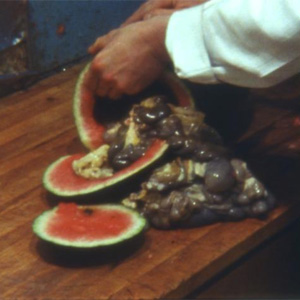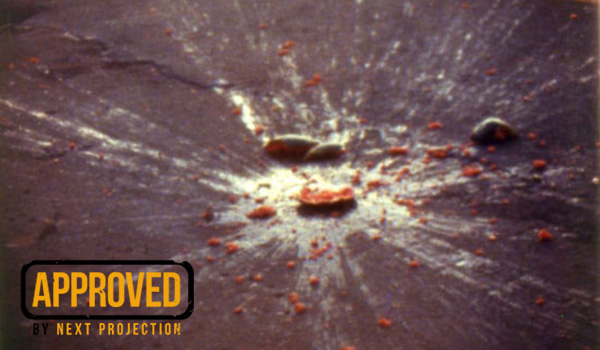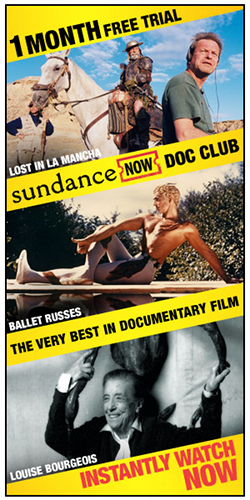Subversive Saturday: Oh Dem Watermelons (1965)
Director: Robert Nelson
Country: USA
Genre: Short | Experimental
Watch It: Here
Editor’s Note: The following review is a continuation of Matthew Blevins’ Subversive Saturdays series.
The course of human history is plagued by ugliness that is both unavoidable and unfortunately integral to the evolution of civilization. It would be all too convenient to forget that Minstrel Shows were the most popular form of American entertainment for half a century, but to do so would be turning a blind eye to the truths that brought us to where we are. So how does one accept the ugly truths that plague us to this day without damning all of human civilization for its prior (and ongoing) misdeeds? Robert Nelson used a trick we have all known since we were children to take the power out of the societal taboos and deweaponizes the imagery by looking at it head-on until it loses context and power. Repeating a word until it becomes merely sounds that lose all meaning is something that every child does at some point, and this is what Nelson has done with Oh Dem Watermelons. Nelson pauses the catchy Stephen Foster Minstrel tune and lets it repeat the word “watermelons” over and over again, attacking its meaning and robbing it of its power as a social taboo. By taking the opposite approach to popular history’s tendency to glaze over the uglier parts of our societal evolution, he instead looks at it squarely and inserts the taboo in every image to rob it of its power, and forces us to contend with the ugliness that has shaped our very nature.
Robert Nelson used a trick we have all known since we were children to take the power out of the societal taboos and deweaponizes the imagery by looking at it head-on until it loses context and power. Repeating a word until it becomes merely sounds that lose all meaning is something that every child does at some point, and this is what Nelson has done with Oh Dem Watermelons.
 Nelson uses a combination of experimental cinema techniques to put the image of the watermelon in every possible context in the film’s short eleven minute runtime. He smashes it, stabs it, blows it up, throws it in the toilet, drops it from the sky, but most importantly forces us to look at the image and contend with our own lack of righteousness. Nelson injects the watermelon in to historical images, suggesting that despite the great strides made by the civil rights movement those societal stigmas will plague our perceptibility until the end of our civilization. The watermelon also acts as an analogue for minorities in Oh Dem Watermelons, and in one sequence a naked white woman is enraptured by the pieces of a watermelon. She suggestively rubs its remains over her naked breasts, hinting at the conditions of race relations and perceptions of interracial relationships at the time the film was made.
Nelson uses a combination of experimental cinema techniques to put the image of the watermelon in every possible context in the film’s short eleven minute runtime. He smashes it, stabs it, blows it up, throws it in the toilet, drops it from the sky, but most importantly forces us to look at the image and contend with our own lack of righteousness. Nelson injects the watermelon in to historical images, suggesting that despite the great strides made by the civil rights movement those societal stigmas will plague our perceptibility until the end of our civilization. The watermelon also acts as an analogue for minorities in Oh Dem Watermelons, and in one sequence a naked white woman is enraptured by the pieces of a watermelon. She suggestively rubs its remains over her naked breasts, hinting at the conditions of race relations and perceptions of interracial relationships at the time the film was made.
Nelson uses a combination of experimental cinema techniques to put the image of the watermelon in every possible context in the film’s short eleven minute runtime. He smashes it, stabs it, blows it up, throws it in the toilet, drops it from the sky, but most importantly forces us to look at the image and contend with our own lack of righteousness.
 We must never forget where we came from, otherwise we may never learn from our mistakes. We must also learn to recognize the inherent flaws in our nature if we are ever to overcome them. I’m not sure that we ever will, though. Our competitive nature stems from countless generations of genetically propagated survival instincts, and anyone that abides by different philosophies, different concepts of morality, or looks different than us is instantly distrusted because we have never outgrown that component of ourselves, despite its irrelevance to our need to survive in modern society. Once you have marginalized someone’s humanity because they look or think differently than you, then you have essentially become a victim of obsolete animalistic instincts that may have at one time been necessary for our survival as a species. It is easy to dehumanize the person that we do not know, because we are unable to see ourselves in their appearance or actions.
We must never forget where we came from, otherwise we may never learn from our mistakes. We must also learn to recognize the inherent flaws in our nature if we are ever to overcome them. I’m not sure that we ever will, though. Our competitive nature stems from countless generations of genetically propagated survival instincts, and anyone that abides by different philosophies, different concepts of morality, or looks different than us is instantly distrusted because we have never outgrown that component of ourselves, despite its irrelevance to our need to survive in modern society. Once you have marginalized someone’s humanity because they look or think differently than you, then you have essentially become a victim of obsolete animalistic instincts that may have at one time been necessary for our survival as a species. It is easy to dehumanize the person that we do not know, because we are unable to see ourselves in their appearance or actions.
Once you have robbed a person or race of people of the common bond that we all share as flawed members of a species of opportunistic narcissists, then it becomes quite easy to commit atrocities against them. That sentiment is perfectly captured by Nelson when he places the smashed remains of a watermelon outside of a bus stop. The passengers of the bus merely step over its carcass on their way to wherever it was they were in such a hurry to get to. In that few seconds, he instantly captures the core of our problems as a species. We are so concerned with the here and now that we are incapable of seeing the overarching issues that shape the conditions of our reality. I understand the need to pick your battles, and that the problems of the world are too vast in number to solve, but the least we could do is occasionally reflect on the problems of others before we obliviously step over them on our way to wherever it is we were going. Maybe then we can empathize and learn to see ourselves in those that look, think, or act differently than ourselves. Probably not, though.














 Review: The Samaritan (2012)
Review: The Samaritan (2012) DVD Review: We Were Here (2011)
DVD Review: We Were Here (2011) Review: Blood of My Blood (2011)
Review: Blood of My Blood (2011) Review: Damsels in Distress (2011)
Review: Damsels in Distress (2011) DVD Review: My Perestroika (2010)
DVD Review: My Perestroika (2010)

